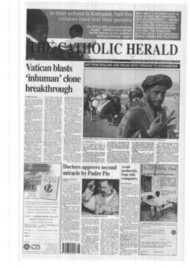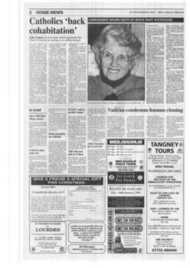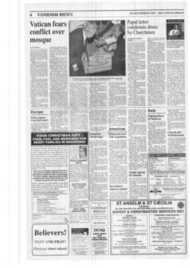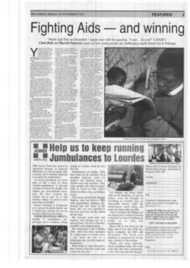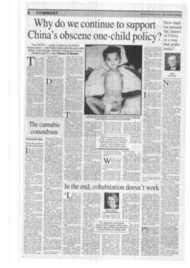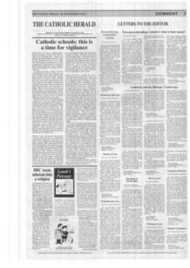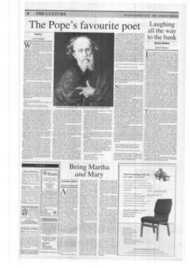Page 8, 30th November 2001
Page 8

Report an error
Noticed an error on this page?If you've noticed an error in this article please click here to report it.
Tags
Share
Related articles
World Of The Pope
John Paul To Mark 25 Years As Pope With Eagerly-awaited...
Francis Thompson: The Poet Of The Return To God
The Strange Story Of Francis Thompson
Pope Inspires Poles To Rise To The Challenge Of Freedom
The Pope's favourite poet
Poetry
Luke Coppen
WhenWhen Cyprian Norwid died, in 1883, he behind a life of poverty, exile, failure and rejection. The poet, who spent is final years in a home for destitutes, was given a pauper's burial. His remains were Iropped into a communal grave on the outskirts of
aris, and his life forgotten.
More than a century later, in one of the large, narbled halls of the Vatican, Pope John Paul 11 Jescribed Norwid as "one of Christian Europe's rteatest poets and thinkers". He was an artist with whom he had been bound "by a deep spiritual dnship" and to whom he had turned in the darkest noments of his life for The light that lets us more Jeeply penetrate the truth of our being as human aensons". For Norwid, it was the end of a remarkable lowney from obscurity to artistic glory.
Despite the Pope's endorsement, Norwid's work -emains little known outside his native Poland. And yet, without some familiarity with his life and art, it s impossible to undetstand the origin of many of John Paul H's most powerful intuitions and ideas. For Norwid and the Pope share many basic convictions — from the redemptive value of suffering to the lignity of work, farom human dignity to the beauty of God.
In his speech this summer, the Pope said he first encountered the poet in the 1930s. Karol Wojtyla, who was then an aspiring actor with no thoughts of the priesthood, became fascinated with Norwid luring his secondary school years. The first public Jisplay of this fascination came in 1935, when Wojtyla chose td recite one of Norwid's works at a school poetry-reading competition. He chose to recite Tromethidion", a complex poem on the beauty of Divine love and human labour. His performance included the lines Beauty is not to stay hidden, Neither is the salt of the earth to be used only in the kitchen But beauty is to make you eager for work And work is for man to gain his resurrection this he echoed half a century later in Laborrm Exercens, his ground-breaking encyclical on human work. It was a restrained and accomplished performance, but Wojtyla lost the competition to his friend, and fellow teenage thespian, Halina Krolliciewicz.
According to Jerzy Peterkiewicz, the 85-year-old Polish writer, who has translated both the poetry of Norwid and the Pope into English, Wojtyla's fascination with the elder poet was characteristic of his generation. "Every generation of students looks for a charismatic writer who is not widely known," he said. "Wojtyla's generation found Norwid. They were looking for something that was close to the truth, to what life was about, so they turned to him."
In 1939, after the Nazi invasion of Poland, Wojtyla's engagement with Norwid deepened significantly. Living under the daily threat of death or deportation, the young student drew courage and inspiration from the poet's work.
"The people who read him during the occupation were hearing horrible stories," Peterkiewicz said. "Norwid once described the truth as 'a dark thing'. We know that, if we look around today, he is right. We don't know how things will evolve. We must pay attention to the darkness. We cannot ignore it. Norwid offered Wojtyla's generation a dark truth."
According to the Pope himself, Norwid's poems reinforced his hope in God during the darkest hours of the occupation. "He helped us to persevere with the truth," he recalled, a truth "given to us to be lived with dignity". Norwid thus confirmed Wojtyla in his greatest intuition: that every human life was of incalculable worth. Norwid did not stop at human dignity; he taught that human beings had a duty to be heroic in the pursuit of truth. Perhaps this is the root of Wojtyla's insistence on the need for heroism in Christian life. As Pope, he has repeated that it is not enough for Christians to live mediocre lives, or merely to follow conventional morality. For him, Christians are called to go further. They must strive to live heroic lives of faith and virtue, because "without heroism, humanity ceases to be itself'.
To understand why Norwid emphasised the value of human work, human dignity and the need for heroism, it is necessary to know something of his life.
The poet was born exactly 180 years ago in the Polish village of Laskowo-Gluchy. At the age of four, he lost his mother. A few years later, he saw the brutal repression of the 1830 insurrection, which sent thousands of Poles into exile.
As a young man, Norwid was a dashing, foppish figure. He boasted of his royal ancestry (he was a Sobieski on his mother's side) and his early poems made him a guest at Warsaw's smartest artistic salons. When he tired of the capital, the young artist set out on foot in search of Poland's rich and varied folklore. He kept a minute record of the faces and landscapes he encountered in his meandering journeys.
His curiosity did not stop at Poland's borders. In his early twenties, he made a tour of Europe and was astonished by the continent's great wealth of antiquity. In 1843, he lived in Italy, where he studied painting and sculpture. It was here that he met his muse, Maria Kalergis, a divorcee and enthralling society beauty. Although she quickly tired of his witty repartee, he remained hopelessly in love with her for the rest of his life.
In 1849, Norwid left Poland for what proved to be a lifelong exile from his homeland. After a brief imprisonment in Berlin for giving his passport to a deserting Russian soldier, he arrived in Paris, the world capital of the arts. There he befriended Frederic Chopin and Juliusz Slowacki, outstanding fellow Polish exile artists. Norwid scraped by, working as a painter, sculptor and poet. But none of these professions earned hint enough to live upon, and So he depended upon the charity of his friends. Alter a string of misfortunes, however, he left France, bound for the New World.
In New York, he found work as a freelance illustrator, contributing drawings to the catalogue of the Universal Exhibition. Norwid, who was initially impressed by the American experiment, soon became disillusioned.
In a biting poem, "To John Brown, Citizen", he wondered how the "land of the free" could tolerate the practice of slavery. IIe was also appalled by the squalor he found in a country that was already on the way to becoming the richest nation on earth.
He returned to Europe in 1854, stopping briefly in London, when: he penned the chilling poem, "Larva", which describes an Englishman wallowing in a gutter after an evening at the pub: Is he crowned with thorns or dirt?
Impossible to tell He is a book of holy writ Rolling about in the dirt The desperate circumstances of Norwid's life in London are conveyed in a letter to his cousin, written from his sick bed in a seedy hotel in Euston Square. "I hasten to write to you, imploring you to advance me as much as eight pounds which if forwarded soon — might put me on my feet and allow me to profit from these important connections, because of which and for which I came here but what can be made out of wind or out of nothing at all?" We do not know if he received his eight pounds, but we do know that not long afterwards he was back in Paris. In 1877, he was forced to enter a home for destitute exiles. There is a remarkable portrait from this time, by the Polish painter Pantaleon Szyndler. Norwid is presented as an Old Testament prophet: with a dick white beard, powerful forehead and piercing gaze. The painting captures Norwid's proud poverty and burning faith, This is also expressed in two of his most beautiful lines of poetry: The crown of laurels and hope are for someone else: For me, the only honour is to be a man .o Fe
These lines would have provided a worthy epitaph for Norwid. But when he died, after six years at the home for destitutes, he didn't leave enough money to buy even a gravestone. All that he left behind in his mom was an unruly heap of poems, sketches and paintings. (It is said that his nude studies were destroyed by thetirudish nuns who ran the home.) For the rest of the 19th century, he lay in a communal grave, utterly forgotten.
orwid's work was rediscovered, serendipi tously, at the beginning of the 20th century, after a Polish critic chanced upon a collection of his verse at a second-hand bookshop in Munich. He appealed in a litany magazine for original manuscripts and gradually reassembled them. Some very important poems were found in a trunk in Cairo. It was not until 1976 that the last volume of Norwid's collected works finally appeared.
In Poland, Norwid is now considered one of the country's four great bards — beside Mickiewicz, Slowacki and Krasinski. But he has only begun to receive the international attention he deserves after Karol Wojtyla's election to the papacy. As Pope, Wojtyla has continued to read Norwid's poems and to allow his own ideas to be nourished in the soil of the poet's imagination. In the summer, he noted that he had an immense "personal debt of gratitude" to Norwid for his prophetic insights and heroic life. Norwid's power, the Pope suggested, came from his understanding and welcoming of the Cross in his difficult life. The poet's maxim — "Not behind us with the Saviour's Cress, but behind the Saviour with our own Cross" — enabled him to judge men according to how willing they were to suffer misfortune and humiliation for Christ who "is and was and will be the root of all truth".
Despite the disappointments and hardships of the poet's life, John Paul did not hesitate to call him "the man of hope". The source of his hope, he said, was a living relationship with God. Perhaps this is Norwid's secret: despite every failure and setback, he lived in the belief that his words would eventually be heard, that Poland would be liberated and that man would grow to his full stature in the image and likeness of God. He sensed, prophetically, that he would be discovered and re-ad long after his body had crumbled away.
The son will pass this writing by, but his son Will recall what vanishes today (now read In haste) under the rule of Print-Pantheism And will recall me, since I will have vanished Cyprian Norwid: Poems, Letters, Drawings, edited and translated by Jerzy Petenkiewicz, is published by Carcanet Press, priced £7.95. To order a copy, contact the Veritas Foundation, 63 Jeddo Road, London, W12 9EE. Tel. 020 8749 4957.
blog comments powered by Disqus


